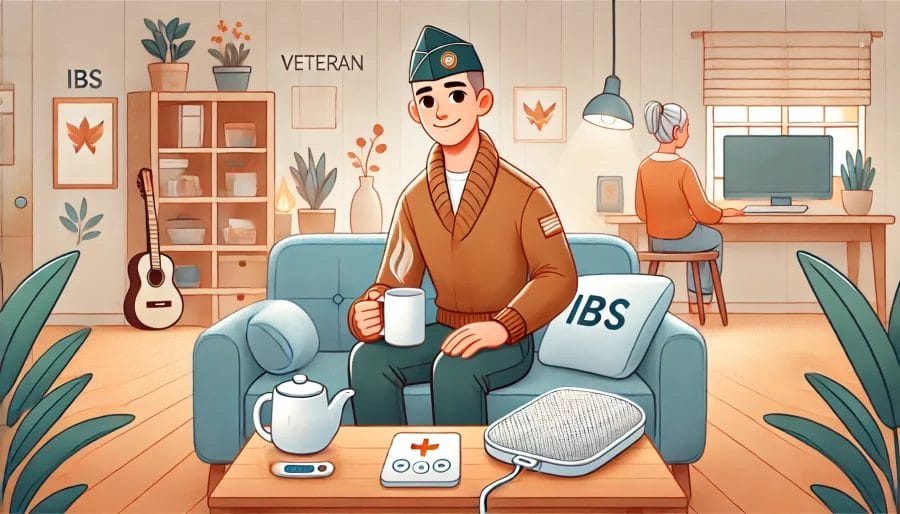This guide explains the IBS VA disability, the claim process, and how to maximize your chances of receiving benefits.
Irritable Bowel Syndrome (IBS) is a common condition affecting many veterans, often linked to military service due to stress, gastrointestinal infections, or other service-related causes. Veterans with service-connected IBS may qualify for VA disability compensation.
** See all of our VA Disability Claims Process Articles here **
Understanding IBS VA Disability
What Is IBS?
Irritable Bowel Syndrome (IBS) is a gastrointestinal disorder characterized by chronic abdominal pain, bloating, and altered bowel habits (diarrhea, constipation, or both). IBS is considered a functional gastrointestinal disorder, meaning it is a condition that affects the normal functioning of the intestines without identifiable physical damage.
Symptoms of IBS
Common symptoms of IBS include:
- Abdominal pain: Cramping or discomfort in the abdomen, often relieved by a bowel movement.
- Bloating: A sensation of fullness or swelling in the abdomen.
- Diarrhea or constipation: Frequent loose stools (diarrhea) or difficulty passing stools (constipation), or alternating between the two.
- Gas: Increased gas and flatulence.
Causes and Risk Factors
The exact cause of IBS is unclear, but several factors may increase the risk, including:
- Stress: Chronic stress is a significant trigger for IBS symptoms.
- Infections: A history of gastrointestinal infections, often occurring in military environments, can lead to post-infectious IBS.
- Diet: Certain foods can exacerbate symptoms.
- Mental Health: Anxiety and depression are often associated with IBS, and mental health issues can aggravate gastrointestinal symptoms.
AI Powered Chatbot for VA Disability Claims
Learn more about the VA Disability process and get help with our VA Disability Claim Chatbot programmed and trained by AI

IBS VA Disability Ratings
The IBS VA Disability rates Irritable Bowel Syndrome (IBS) under Diagnostic Code 7319 . The rating depends on the severity and frequency of symptoms and their impact on daily functioning. The possible ratings range from 0% to 30%.
0% Rating
- Criteria: Mild symptoms of IBS with occasional episodes of abdominal distress.
- Symptoms: Mild discomfort with minimal impact on daily life.
- Impact: IBS is present, but symptoms do not significantly interfere with work or daily activities.
- Compensation: No compensation is provided at this level, but the condition is acknowledged by the VA.
10% Rating
- Criteria: Moderate symptoms, with frequent episodes of bowel disturbance and abdominal distress.
- Symptoms: Abdominal pain, diarrhea, or constipation occurring frequently but not constantly.
- Impact: IBS moderately interferes with daily activities and work, but symptoms can be managed.
- Compensation: Veterans at this level receive some compensation, recognizing the moderate impact of IBS on their daily life.
30% Rating
- Criteria: Severe symptoms, with frequent episodes of diarrhea or alternating diarrhea and constipation, accompanied by constant abdominal distress.
- Symptoms: Constant pain, bloating, and frequent diarrhea or alternating between diarrhea and constipation.
- Impact: Symptoms are severe enough to substantially limit daily activities and job performance. It may require constant medical care and dietary changes.
- Compensation: This is the highest rating for IBS, acknowledging the significant impact on the veteran’s quality of life.
Filing a VA Claim for IBS VA Disability
Step-by-Step Guide
- Obtain a Diagnosis: A formal diagnosis from a medical professional is required for an IBS VA disability claim. Ensure that your medical provider clearly documents your IBS symptoms, the frequency of flare-ups, and their impact on your daily life.
- Gather Evidence: Collect medical records, service records, and personal statements about how IBS affects your daily functioning and work. Service records showing gastrointestinal issues or stress during service can strengthen your claim.
- File VA Form 21-526EZ: This is the form used to apply for disability compensation. You can file online for the VA Disability claim or submit the form by mail to your local VA office.
- Submit Evidence of Treatment: Provide records showing treatments you’ve received for IBS, including any medications, diet changes, or therapy prescribed to manage symptoms.
- Attend a Compensation and Pension (C&P) Exam: The VA will schedule a C&P exam where a medical professional will assess the severity of your IBS and how it affects your life. Be honest and clear about your symptoms during the exam.
- Receive Your VA Decision: After reviewing your medical records, service connection evidence, and the C&P exam results, the VA will assign a disability rating based on the severity of your IBS.
IBS and Secondary Service Connection
In some cases, IBS may be secondary to other service-connected conditions, such as:
- PTSD: Veterans with Post-Traumatic Stress Disorder (PTSD) often experience gastrointestinal issues, and IBS can be considered secondary to PTSD.
- Anxiety or Depression: Mental health conditions can exacerbate or trigger IBS symptoms.
- Gulf War Syndrome: Veterans who served in the Gulf War are more likely to develop IBS, and it may qualify as part of a presumptive condition under Gulf War Syndrome.
If IBS is secondary to another service-connected condition, you can file a secondary service connection claim to receive compensation for both conditions.
How to Maximize Your VA Rating for IBS
- Provide Detailed Evidence: Document your symptoms clearly, including how often they occur and how they interfere with your daily life and work. Personal statements from family members or colleagues about how IBS affects you can be helpful.
- Track Flare-Ups: Keep a log of your IBS symptoms, noting the frequency of bowel movements, pain levels, and any dietary or lifestyle changes that help or worsen your condition.
- Claim Secondary Conditions: If you have any secondary conditions (like anxiety, depression, or other gastrointestinal disorders), file for them along with your IBS claim to maximize your overall rating.

Common Mistakes to Avoid
- Not Providing Enough Evidence: Insufficient medical documentation or lack of detail about how IBS affects your life can result in a lower rating or denial of your claim.
- Underreporting Symptoms: Veterans may downplay their symptoms during the C&P exam. Be honest and thorough about how IBS impacts your daily life.
- Missing Deadlines: Respond promptly to any VA requests for additional information to avoid delays or denial of your claim.
Understanding the VA rating for IBS is key to ensuring you receive the compensation you deserve. By providing thorough documentation, attending the C&P exam, and filing for secondary conditions, you can maximize your VA disability rating and improve your quality of life. For additional support, consider consulting a Veterans Service Officer (VSO) who can assist with your claim.
For more details on filing a VA disability claim, visit the How to File a VA Disability Claim page or consult with a Veterans Service Officer (VSO).
